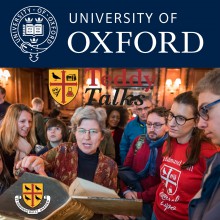
Relevant Links
The Research Expo is a biennial event at St Edmund Hall, designed to showcase the breadth of research carried out at the College, by both academics and students. This series includes an overview video introducing the event, and then a set of short ‘Teddy Talks’ on a wide range of topics from gravitational waves to medieval history, all aimed at a non-specialist audience. The speakers are academics or postgraduate students at St Edmund Hall (also known as ‘Teddy Hall’), one of the colleges of the University of Oxford.
| # | Episode Title | Description | People | Date | |
|---|---|---|---|---|---|
| 15 | St Edmund Hall Research Expo 2017: Introduction | A quick overview of the event, presented by Dr Linda Yueh. | Linda Yueh | 03 Apr 2017 | |
| 14 | Lights, Camera, Immuno-action! Research on cancer immunotherapy and its implications for the clinic | Melissa Bedard explains the body’s lack of an immune response to cancer cells through an analogy with spy movies. | Melissa Bedard | 03 Apr 2017 | |
| 13 | The Politics of Student Mobility: what do international student statistics tell us about the democratic development of their home countries? | Can you view studying abroad as an apprenticeship in democracy? Maia Chankseliani discusses her work, which focusses on former Soviet Union countries, linking student mobility with the level of democratic development in the student’s home country. | Maia Chankseliani | 03 Apr 2017 | |
| 12 | NextBASS: Observing Cosmic Microwave Background Foregrounds | Jaz Hill-Valler (DPhil student, Experimental Radio Cosmology) gives an introduction to the work of radio astronomers by postgraduate student Jaz, who works with the Experimental Radio Cosmology group and Department of Astrophyics. | Jaz Hill-Valler | 03 Apr 2017 | |
| 11 | Pancreatic Islet Transplantation for Type 1 Diabetes – Bench to Bedside | Paul Johnson (Professor of Paediatric Surgery) gives a talk on a new treatement for Type 1 diabetes. Type 1 diabetes is an auto-immune disease where the patient’s body has attacked its own insulin-producing cells. | Paul Johnson | 03 Apr 2017 | |
| 10 | Extreme Clocks: Physics with Pulsars | An introduction to pulsars: objects that have more mass than the sun but are only around 20km in diameter, possessing an extremely high rotational stability and a very strong magnetic field. | Aris Karastergiou | 03 Apr 2017 | |
| 9 | Merchants’ Marks in Medieval English Books | Merchants’ marks were used initially as a tool of commerce, on consignments of goods, in the Middle Ages. In the sixteenth century, however, they became more like a coat of arms for people who didn’t have one – a form of professional identity. | Thomas Kittel | 03 Apr 2017 | |
| 8 | Banned Books: Hus and Luther in the Teddy Hall Library | This talk focusses on a first edition of the collected works of Jan Hus, from the collection in St Edmund Hall’s Old Library, written in the fifteenth century but first printed in 1558 together with letters of recommendation from Martin Luther. | Henrike Lähnemann | 03 Apr 2017 | |
| 7 | ‘Boom, ratatata, hui-hui-sss-ttt, woouum’ - Children’s Views of World War II | How do people remember the past? Alex Lloyd (Lecturer, German Language and Literature) looks at essays written by children in Germany after the Second World War–examining the words and tone; the political framing; and the challenges for translating them. | Alex Lloyd | 03 Apr 2017 | |
| 6 | Lithium-ion Batteries and Beyond | Batteries are one of the most efficient ways to store energy, and there has been a massive increase recently in the use of lithium-ion batteries, particularly in electric cars. | Mauro Pasta | 03 Apr 2017 | |
| 5 | Advanced LIGO: the New Era of Gravitational Wave Astronomy | Why has the recent detection of gravitational waves been one of the most important discoveries in modern times for astrophysics? And what are the implications of the new Advanced LIGO gravitational-wave detector for future discoveries about black holes? | Philipp Podsiadlowski | 03 Apr 2017 | |
| 4 | What Does Philosophy Have to Do with Neuroscience? | When you examine the brain, you can learn a lot and see chemical interactions, but you cannot find anything about the first-person nature of things we experience as humans, such as colours and pain. | Paul Skokowski | 03 Apr 2017 | |
| 3 | UK National Debt: A Historical Perspective | The UK national debt is currently the highest it's ever been, and a lot larger than many other countries. This talk takes a look behind the figures, and asks why it is important, whether we should be worried, and looks at the reasons for its growth. | Martin Slater | 07 Apr 2017 | |
| 2 | Ending Poverty? | Linda Yueh (Fellow by Special Election in Economics) talks about ending poverty. | Linda Yueh | 03 Apr 2017 | |
| 1 | Was There History in the Middle Ages? | Did medieval writers think they were writing history? This talk takes a closer look at the various forms of ‘history’ during this period. Emily A. Winkler is (John Cowdrey Junior Research Fellow in History). | Emily A Winkler | 03 Apr 2017 |
